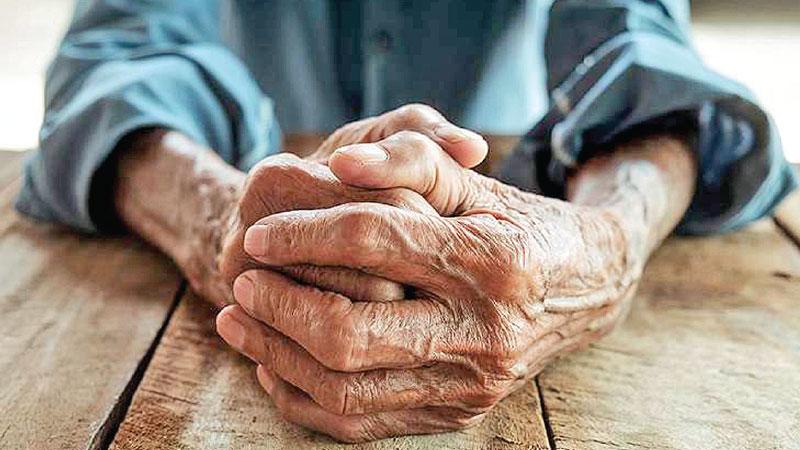
Sri Lanka is experiencing a rapidly aging population. In many aspects, it is becoming a serious challenge. In 2012, the population over 60 years was 2.5 million which was 12.5 % of the total population. By 2021, this elderly population is estimated to increase to about 3.6 million, which is 16.7 % of the total population.
Statistics reveal that our labour migration, concentrated among the young adult working groups, has been increasing since the early 1990s. The total number of Sri Lankans employed abroad at present is estimated as 2.0 million. It is said, over 250, 000 persons migrate annually. As a result of youth migration, the elderly population has been increasing every year.
Based on this migration pattern and the future trends in mortality, fertility and international migration, the population aged 60 and above is projected to increase to 24.8% in 2041. It means, by that time, one in five of the population would be an elderly person.
Definition
The definition of ‘elderly’ varies from society to society. In Sri Lanka, ‘elderly’ is defined as those who are 60 years and above. The reason for taking 60 as a cut-off age is that, in both, government as well as private institutions, the retirement age is between 55 and 60. We believe, the time has come to re-define the term ‘elderly’ in the Sri Lankan context.
The age of 65 is the cut-off age for defining ‘elderly’ in most developed countries, whereas, the UN defines an ‘elder’ as a person who is above 60 years, considering the global perspective. However, Sri Lanka is demographically on par with developed countries with the increased life expectancy. Hence, the authorities could reexamine the cut- off age of becoming elderly, shifting it to 65 years, which would be beneficial to the country.
Challenges
Aging is a complex issue that concerns not only the well-being of senior citizens, but also broader sectors affecting the total population, such as, health, labour markets and public finances. The major concern about old age, for both, the individual and society, is a decline in health, especially, the loss of self-sufficiency and independence.
While health does decline with age, for most senior Sri Lankans, the loss of independence occurs gradually, and eventually, they learn to adapt to the changes.
But, with the growing problem of rising medical costs, many economists believe, an aging population will be a severe burden on our health care system.
Although a large number of senior Sri Lankans suffer from one or more chronic conditions, ranging from arthritis to eye disease, in the majority of these cases they do not prevent them from leading normal lives.
Family
The family has historically provided support, warmth and commitment to the elderly. This is still true, today. Although the nature of the Sri Lankan family has changed over the years, estimates suggest that about 80% of all care for senior Sri Lankans is still provided by the family and close relatives.
Their assistance takes a variety of forms - housework, preparing meals, transport, shopping, and household repairs. Even those who eventually need long-term institutional care generally continue to be supported by friends and family.
Such supportive relationships are a blessing for the senior citizens because everyone needs companionship, and senior citizens are no exception. As wives are generally younger than their husbands, they are more likely to assume a care giving role.
Aging, therefore, is not an issue to be addressed through a single approach, but rather a multi-faceted one. All levels of government and society need to form a working partnership to respond to the challenges of an aging society. The Government should continue to play a more challenging role in addressing the needs of an aging population in a comprehensive and inclusive manner.
A key word when talking about senior Sri Lankans is diversity. Although certain features tend to characterise senior citizens as a group, the seniors differ tremendously. Some are married, some divorced, some widowed. Some live-in urban areas and some in rural areas, and they differ in age. Hence, their lifestyles and needs differ.
Better deal
In this rapidly-changing society, senior citizens in Sri Lanka need a better deal. The following are a few suggestions.
Existing pension schemes are not adequate to cover a majority of the workers. Only the Government and a few segments of the private sector are covered by individualised pension schemes. It is time the Government considers introducing a policy for a non-contributory compulsory pension scheme for all senior citizens.
Cost-effective methods of institutional caring need to be developed with state and community organisations sharing the responsibility. Besides finance, new capacities for caring for the elderly require to be developed and human resources have to be mobilised through voluntary and community participation. Many caring services have been developed recently, but these are far too expensive for the vast majority.
Senior Citizens Committees must be properly regularised at Divisional Secretariat, District, Provincial and National level. They must also be empowered to make representations to the Government about their woes and worries.
Responsibility
Overall, Sri Lanka as a developing country will have a large number of elderly people with inadequate income, leading to poverty. The traditional family support may also be weakened, with changing lifestyles.
These challenges should be addressed with appropriate strategies and timely action taken. The end result should be to ensure dignified and comfortable lives for all senior citizens.
